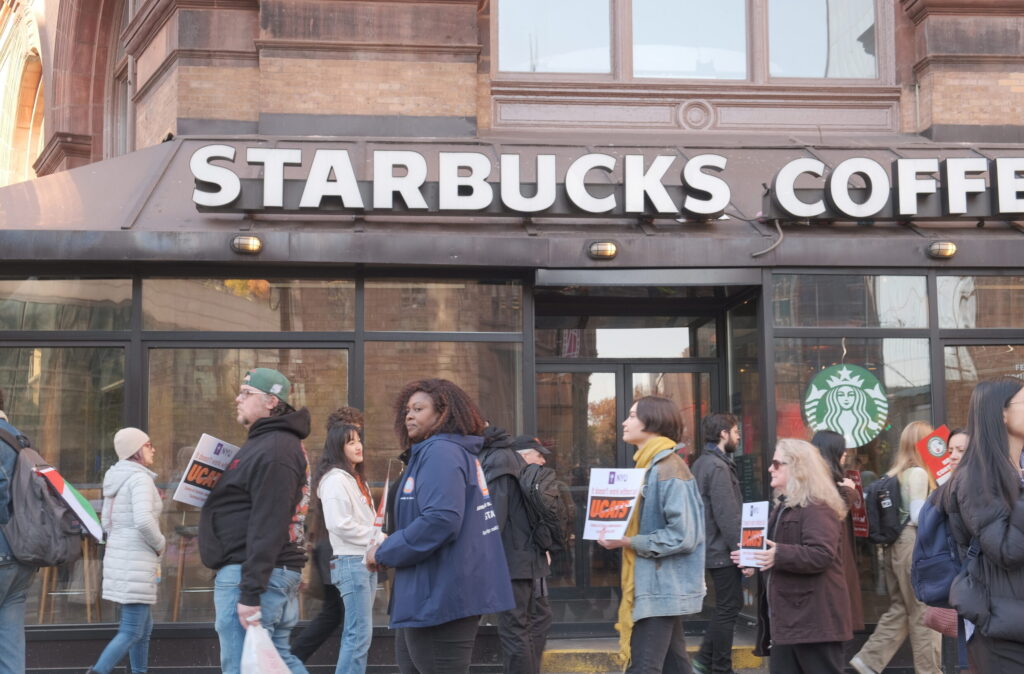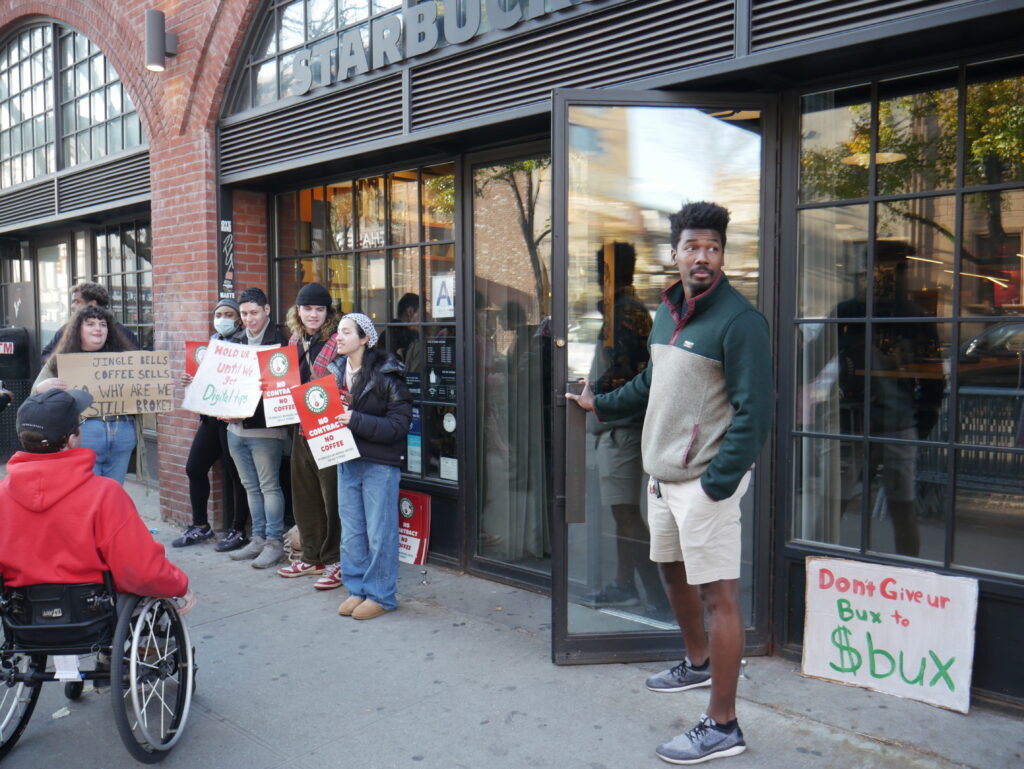By Oona Milliken and Charlie Finnerty | news@queensledger.com
Starbucks workers across eight stores in New York City went on strike in what workers called the “Red Cup Rebellion,” on Wednesday, Nov. 16 and Thursday, Nov. 17. Workers withheld labor on Starbucks’ most profitable day of the year, Red Cup Day, when the coffee chain hands out free reusable red cups to customers who buy certain drinks.
According to an email sent out by Michelle Eisen, a spokesperson for Starbucks Workers United, this was the largest strike in the union’s history. More than 200 locations around the country went on strike, according to a statement sent by Phoebe Rogers, another Union spokesperson. Workers picketing at Starbucks locations across the city called on the company to negotiate with the union for a fair contract and stop attempts at union-busting behaviors intended to prevent or disrupt workers’ attempts to join a union.
James Carr, a Starbucks barista in Astoria, said it was frustrating that company executives were still refusing to negotiate with their employees. Though 361 Starbucks stores are unionized nationwide, there is no collective bargaining agreement between unionized workers and the company. Carr said it was important for workers to continue to strike and withhold their labor so that Starbucks might eventually come to the bargaining table.
“The company is still not negotiating with us. They don’t care, you know what I mean? They don’t care, they won’t negotiate until they’re forced to,” Carr said. “Practicing these strikes, and doing these strikes, is a big part of learning how to build towards the opportunity to leverage a strike or a campaign that’s big enough to force them to negotiate.”

Starbucks workers rally at Astor Place. Photo credit: Charlie Finnerty
The demand for fair wages, reasonable hours, more staff as well as giving digital tips to employees has been an ongoing concern in recent years after Starbucks store workers first unionized in 2021 at a location in Buffalo, NY. That decision has since caused a chain-reaction of stores across the nation to unionize their own stores.
William Perez, a worker at a store in Williamsburg, said he was on strike because Starbucks did not provide him and his fellow employees with digital tips. Furthermore, Perez said his store is perpetually understaffed and overworked.
“I’m here today and so are my coworkers to protest against the malpractice that’s been going on within our company for the last couple of years,” Perez said. “It’s just been going on for too long, and no matter what we do, it just feels like management doesn’t really care too much.”
Starbucks has also withheld benefits from some unionized stores, such as new accrued vacation time or a pay bump for workers who have been Starbucks employees for a certain amount of time. Arianna Ayala, a worker at the Williamsburg location in Brooklyn, said her store has been unionized for about a year and will not be receiving the compensation package announced by the company in the beginning of November.
“Our store is also unionized, so we don’t get any of the new benefits that are being rolled out as a result of the contracts we’re putting out, asking Starbucks for these kinds of benefits. Starbucks is rolling out all these benefits to non-union stores and an asterisk, saying things like ‘In respect for fair bargaining, we are not going to be rolling out these benefits to union stores,’” Ayala said. “A lot of things like how quickly we acquire sick time or vacation, as well as consistent scheduling and availability surrounding that scheduling.”
Workers at a Park Avenue Starbucks location in Manhattan also filed 18 complaints on Nov. 17 alleging the company is violating the city’s Fair Workweek Law, which requires employers to provide consistent scheduling for workers and offer current workers more hours before hiring new part-time employees. In New York City alone this year, Starbucks has now faced 73 charges across 54 stores alleging violation of the Fair Workweek Law.
Striking Starbucks workers and union organizers at the Park Avenue location were joined by City Council Majority Leader Keith Powers, State Senator Jessica Ramos, representatives of 32BJ SEIU of the Building Service Employees International Union, representatives of the United University Professions union for higher education staff and representatives of the SAG-AFTRA union for television and movie actors who recently ended their own months-long strike this month.
“Starbucks is out of compliance with the law,” Ramos said in a speech. “And Starbucks needs to be held accountable. Every single Starbucks worker needs to have fair scheduling, needs to have fair pay, needs to have their union recognized and the union-busting tactics have to go.”
Riley Fell, a union organizer for Starbucks United and former Starbucks worker, said the turnout at the rally was the biggest they’ve seen. In their time as an organizer, Fell said they have watched the Starbucks union movement take off dramatically.
“The amount of union stores has just skyrocketed in the past three years,” Fell said. “It’s really not like anything we’ve ever seen before. I’ve seen more people who are open to the idea of unions in general when they had been extremely closed off before. I’ve seen Starbucks union busting be pretty consistently debunked.”
Fell said the choice to call for the strike on the day of the company’s Red Cup event intended to highlight working conditions on one of the most difficult days for Starbucks workers.
“Today I’m really hoping to just get our message out more especially regarding Red Cup Day,” Fell said. “It’s a difficult day for sure. People don’t understand the toll this day has on workers so I want to get that message out as much as possible.”
Rhythm Heaton is a former shift supervisor at Starbucks’ Astor Place location. In July, a judge ruled Heaton’s termination from the company was a violation of labor law and an attempt to prevent Heaton from organizing a union with their coworkers. Starbucks has appealed their case. Heaton continues to work with Starbucks Workers United as an organizer focused on getting Starbucks to negotiate with their former coworkers.
“We unionized over a year ago,” Heaton said. “We haven’t been to the bargaining table for our specific store so we’re out here fighting the fight. This is a really good turnout and really really good energy.”
Heaton said the higher customer traffic on Red Cup Day brings workers’ challenges at Starbucks to the forefront.
“There’s generally a lot of frustration on Red Cup Day where often they don’t staff us correctly,” Heaton said. “We get a surplus of customers coming in and we suffer for it. So this is a great day to highlight why we’re doing this.”
Carr transferred to the store in Queens right before the pandemic started and said he and his coworkers were inspired by the unionizing effort in upstate New York shortly after. Carr said he was hopeful about the efforts of the Red Cup Rebellion and urged his fellow Starbucks workers to join the union efforts. According to Carr, striking and unionizing are the strongest efforts to stronghold Starbucks to a collective bargaining agreement.
“When we started to see that some of our coworkers in different locations were starting to form a union, we knew that this was the only way to change the company,” Carr said. “We’ve done such a good job shutting [Red Cup Day] down, no one’s been going in. It’s been absolutely dead in there today. We’ve just crushed any opportunity for this to be profitable for them. It’s been a good strike.”

A non-unionized worker in Williamsburg holds the door open for customers whilst other workers picket. Photo credit: Oona Milliken
Information on how the profits of this Red Cup Day compares to those in the past is not yet available, but Starbucks profits rose 12 percent in 2023, as unions reached their highest membership within the company. The company made a record $36 billion dollars after their fiscal year wrapped on Oct. 1. In a press release regarding their new benefits package released on Nov. 6, Starbucks declined to mention strikes or union efforts and stated that they were committed to providing support to their employees.
“For decades, Starbucks has consistently offered hourly partners the best benefits and perks in the industry—including comprehensive medical, dental and vision coverage options for eligible partners and their families and industry-leading gender-affirming care and Family Expansion Reimbursement Assistance benefits,” the Starbucks press release read.
It was not just workers who showed up on Red Cup Day. Emma Catherine, a Brooklyn resident, said she wanted to show up to her local Starbucks to show support for the employees that were striking. Catherine said her husband used to work at Starbucks, and she herself is a former coffee shop barista, so she understood how poorly baristas are treated.
“I’ve kept up with the news and see how Starbucks has consistently disrespected the rights of workers to collectively bargain and organize. That’s something I believe very strongly and that all workers have the right to collectively bargain,” Catherine said. “I want the workers to know that the people in the community support them. I want people in the community to see that it’s not just the workers. Everyone should be participating in this and supporting them because even in a place as gentrified as [Williamsburg], most of the people who are walking by our workers, they’re not capitalists, they’re not bosses, and they should be in solidarity with their fellow workers.”





